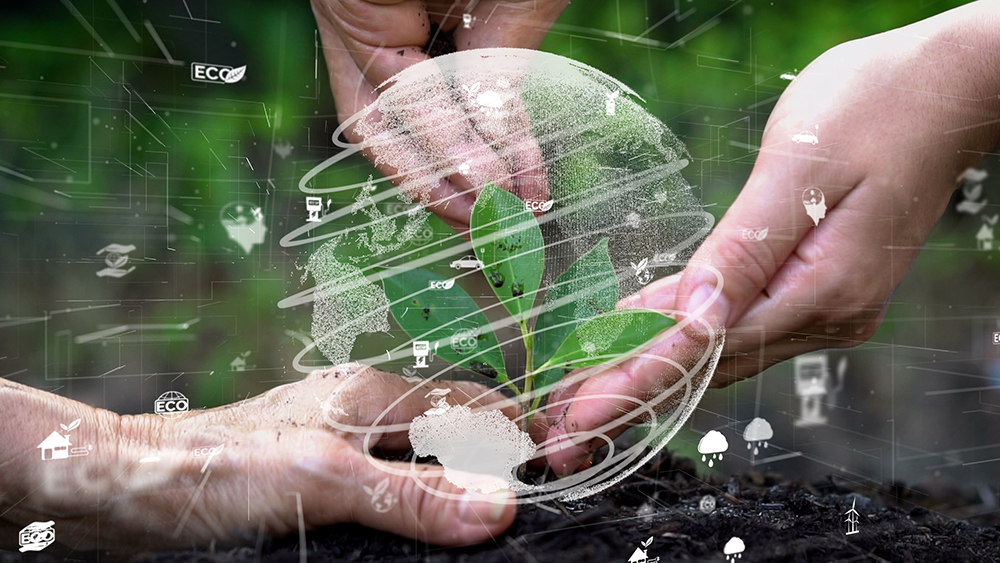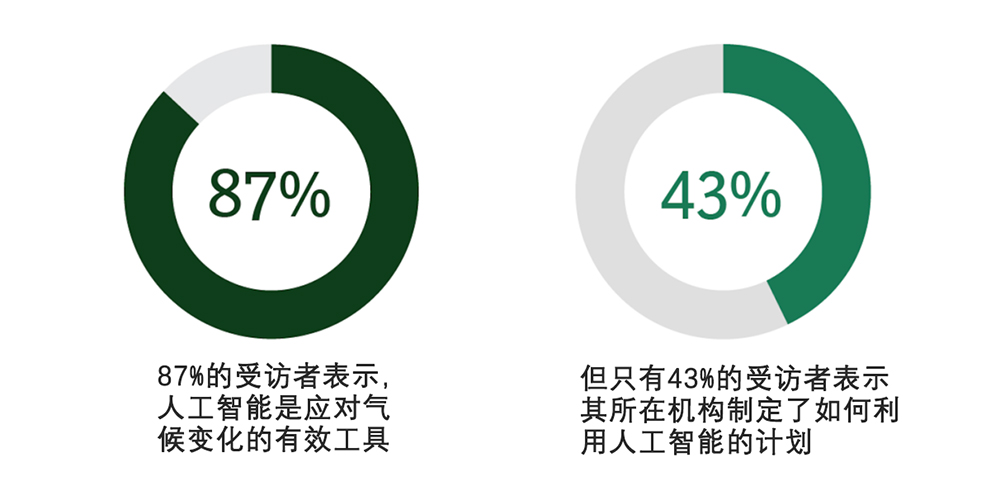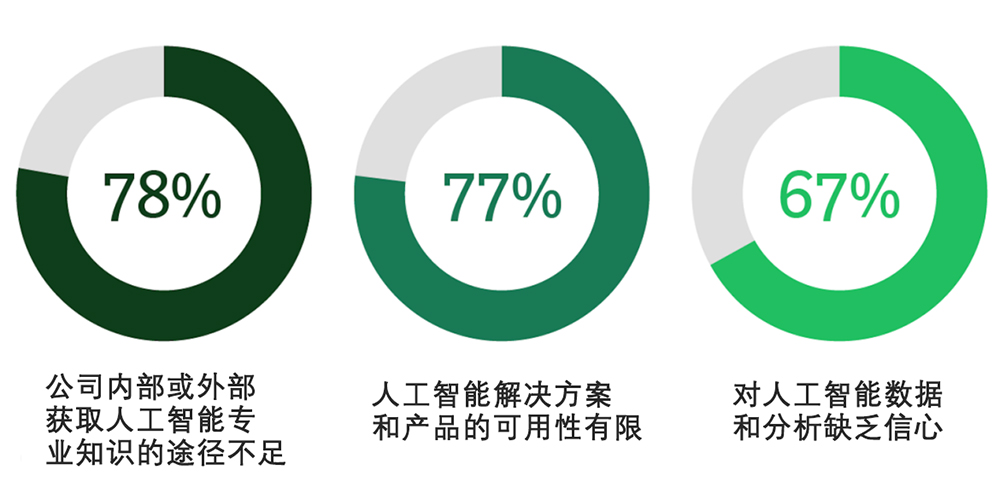
在你的公司,每天或許會做出數百個決策,可能提高或降低公司的可持續性。我們應該選擇哪一家供應商?我們的產品應該采購綠色玻璃還是透明玻璃?我們應該在倫敦還是紐約舉辦會議?
人工智能能夠幫助企業完善決策,從而優化財務業績、改進流程、滿足客戶需求等。它對于企業實現氣候目標同樣關鍵。事實上,人工智能可以收集、整理和解讀龐大復雜的碳排放和氣候影響數據集,因此它對于管理全部氣候相關問題至關重要。
波士頓咨詢公司(BCG)最近對全球1,000位人工智能和氣候領域的領導者進行了調查,向我們展現了人工智能在這方面的潛力,以及在應用人工智能過程中所面臨的障礙。我們發現,有87%的受訪者感覺高級分析和人工智能或者單純的“人工智能”,是目前應對氣候變化的有效工具,但只有43%的受訪者表示計劃利用人工智能幫助公司應對氣候變化。

他們認為人工智能在減少和測算排放方面具有最大的商業價值。事實上,全球領導者能夠通過各種方式利用人工智能實現他們的氣候目標:
減排。人工智能可以幫助測算宏觀和微觀層面的排放,減少排放的影響,并從大氣中清除現有排放。我們在工作中發現,人工智能能夠將一家企業的碳足跡減少5%至10%,如果擴大到全球,減少的溫室氣體排放量就相當于26億噸至53億噸二氧化碳當量。
有一些令人激動的例子可以證明人工智能已經在這方面發揮作用。由阿爾·戈爾投資的氣候跟蹤(跟蹤實時大氣碳排放)(Climate TRACE)聯盟利用衛星圖像和人工智能測算排放量。其成員Blue Sky Analytics能夠專門估算火災產生的排放量。Pachama利用衛星圖像和人工智能測算和監控森林碳匯的變化,以此確定高質量碳信用額度。
波士頓咨詢公司的二氧化碳人工智能平臺可以幫助大規模測算、模擬、跟蹤和優化機構的碳排放。這款可即時部署的軟件能夠在所有工業部門廣泛應用,包括石油天然氣、生物制藥、汽車和消費品等領域。它不僅可以準確測算公司自營業務的直接排放量(范圍一和范圍二排放),還能夠測算公司整個價值鏈產生的更難測算的間接排放(范圍三排放)。
適應性和氣候應變能力。人工智能還適合幫助預測氣候相關危害,包括改善對局部事件的長期預測,比如海平面上升等,或者更新對颶風或干旱等極端現象的預警系統。例如,東南亞地區的一個項目就展示了人工智能和高級分析如何幫助當地社區適應氣候變化。該項目團隊將衛星數據與高級洪水模擬相結合,可以識別醫院等關鍵基礎設施以及最容易暴發洪水的濕地等,從而了解在哪些戰略位置安放人工屏障能夠發揮最大效果。
人工智能也可以幫助管理漏洞和風險,監控當前危機,強化基礎設施(比如通過智能灌溉),通過預測大規模遷徙模式保護人類,以及通過識別和統計物種數量保護生物多樣性等。
研究、金融和教育。人工智能還能夠作為支持氣候研究和模擬的有效工具,幫助了解氣候變化的規模,并為政策決策提供參考。人工智能可以預測碳價格,在氣候金融方面發揮著關鍵作用。人工智能還能夠通過個性化的工具幫助教育公眾,影響行為,例如預測個人碳足跡,或者推薦購買氣候友好的商品等。無論是減排還是適應氣候變化,或者提升氣候應變能力,投資這些人工智能驅動的基礎領域將是成功的關鍵。
克服人工智能應用的障礙
既然強大的人工智能有這么多機會在應對氣候變化方面發揮作用,到底是什么讓企業遲遲不愿意擴大人工智能的應用范圍呢?在有些領域,人工智能解決方案已經非常成熟,可以進行廣泛應用,但大多數現有解決方案不成體系,可能難以獲得,并且缺少擴大規模的資源。有78%的受訪者表示,應用人工智能的障礙源于沒有充分的人工智能專業知識,77%的受訪者提到了有限可用性,而有67%的受訪者則是由于對人工智能相關數據和分析缺乏信心。

人工智能并非萬能靈藥。它只是我們用來應對氣候變化這項全球挑戰的諸多工具之一。但它能夠幫助我們選擇一條更明智、日益以數據驅動的和更快速的道路,而且我們沒有時間可以浪費。(財富中文網)
本文作者克里斯托夫·施偉策(Christoph Schweizer)現任波士頓咨詢公司全球首席執行官。波士頓咨詢公司是《財富》雜志“零排放路徑”(Path to Zero)項目的合作伙伴。
譯者:劉進龍
審校:汪皓
在你的公司,每天或許會做出數百個決策,可能提高或降低公司的可持續性。我們應該選擇哪一家供應商?我們的產品應該采購綠色玻璃還是透明玻璃?我們應該在倫敦還是紐約舉辦會議?
人工智能能夠幫助企業完善決策,從而優化財務業績、改進流程、滿足客戶需求等。它對于企業實現氣候目標同樣關鍵。事實上,人工智能可以收集、整理和解讀龐大復雜的碳排放和氣候影響數據集,因此它對于管理全部氣候相關問題至關重要。
波士頓咨詢公司(BCG)最近對全球1,000位人工智能和氣候領域的領導者進行了調查,向我們展現了人工智能在這方面的潛力,以及在應用人工智能過程中所面臨的障礙。我們發現,有87%的受訪者感覺高級分析和人工智能或者單純的“人工智能”,是目前應對氣候變化的有效工具,但只有43%的受訪者表示計劃利用人工智能幫助公司應對氣候變化。
他們認為人工智能在減少和測算排放方面具有最大的商業價值。事實上,全球領導者能夠通過各種方式利用人工智能實現他們的氣候目標:
減排。人工智能可以幫助測算宏觀和微觀層面的排放,減少排放的影響,并從大氣中清除現有排放。我們在工作中發現,人工智能能夠將一家企業的碳足跡減少5%至10%,如果擴大到全球,減少的溫室氣體排放量就相當于26億噸至53億噸二氧化碳當量。
有一些令人激動的例子可以證明人工智能已經在這方面發揮作用。由阿爾·戈爾投資的氣候跟蹤(跟蹤實時大氣碳排放)(Climate TRACE)聯盟利用衛星圖像和人工智能測算排放量。其成員Blue Sky Analytics能夠專門估算火災產生的排放量。Pachama利用衛星圖像和人工智能測算和監控森林碳匯的變化,以此確定高質量碳信用額度。
波士頓咨詢公司的二氧化碳人工智能平臺可以幫助大規模測算、模擬、跟蹤和優化機構的碳排放。這款可即時部署的軟件能夠在所有工業部門廣泛應用,包括石油天然氣、生物制藥、汽車和消費品等領域。它不僅可以準確測算公司自營業務的直接排放量(范圍一和范圍二排放),還能夠測算公司整個價值鏈產生的更難測算的間接排放(范圍三排放)。
適應性和氣候應變能力。人工智能還適合幫助預測氣候相關危害,包括改善對局部事件的長期預測,比如海平面上升等,或者更新對颶風或干旱等極端現象的預警系統。例如,東南亞地區的一個項目就展示了人工智能和高級分析如何幫助當地社區適應氣候變化。該項目團隊將衛星數據與高級洪水模擬相結合,可以識別醫院等關鍵基礎設施以及最容易暴發洪水的濕地等,從而了解在哪些戰略位置安放人工屏障能夠發揮最大效果。
人工智能也可以幫助管理漏洞和風險,監控當前危機,強化基礎設施(比如通過智能灌溉),通過預測大規模遷徙模式保護人類,以及通過識別和統計物種數量保護生物多樣性等。
研究、金融和教育。人工智能還能夠作為支持氣候研究和模擬的有效工具,幫助了解氣候變化的規模,并為政策決策提供參考。人工智能可以預測碳價格,在氣候金融方面發揮著關鍵作用。人工智能還能夠通過個性化的工具幫助教育公眾,影響行為,例如預測個人碳足跡,或者推薦購買氣候友好的商品等。無論是減排還是適應氣候變化,或者提升氣候應變能力,投資這些人工智能驅動的基礎領域將是成功的關鍵。
克服人工智能應用的障礙
既然強大的人工智能有這么多機會在應對氣候變化方面發揮作用,到底是什么讓企業遲遲不愿意擴大人工智能的應用范圍呢?在有些領域,人工智能解決方案已經非常成熟,可以進行廣泛應用,但大多數現有解決方案不成體系,可能難以獲得,并且缺少擴大規模的資源。有78%的受訪者表示,應用人工智能的障礙源于沒有充分的人工智能專業知識,77%的受訪者提到了有限可用性,而有67%的受訪者則是由于對人工智能相關數據和分析缺乏信心。
人工智能并非萬能靈藥。它只是我們用來應對氣候變化這項全球挑戰的諸多工具之一。但它能夠幫助我們選擇一條更明智、日益以數據驅動的和更快速的道路,而且我們沒有時間可以浪費。(財富中文網)
本文作者克里斯托夫·施偉策(Christoph Schweizer)現任波士頓咨詢公司全球首席執行官。波士頓咨詢公司是《財富》雜志“零排放路徑”(Path to Zero)項目的合作伙伴。
譯者:劉進龍
審校:汪皓
Every day, people throughout your organization make decisions—possibly hundreds of them—that either increase or decrease its sustainability. Which supplier should we choose? Do we procure green glass or clear glass for our product? Should we host the conference in London or New York?
Just as artificial intelligence has improved the decisions organizations make to optimize financial performance, improve processes, meet customer needs, and more, it will be critical in helping them reach their climate goals. In fact, because it can gather, complete, and interpret large, complex datasets on emissions and climate impact, A.I. is fundamentally important in helping to manage the full range of climate-related issues.
BCG recently conducted a global survey of 1,000 leaders in A.I. and climate that tells us more about that potential—as well as the barriers getting in the way. We found that 87% of respondents feel that advanced analytics and A.I., or simply “A.I.,” is a helpful tool in the fight against climate change today, but only 43% say that they have a vision for using A.I. in their own climate change efforts.
They see the greatest business value for AI in the reduction and measurement of emissions. In fact, there are many diverse ways in which global leaders can use A.I. to achieve their goals:
Mitigation. A.I. can help measure emissions at the macro and micro levels, reduce the effects of emissions, and remove existing emissions from the atmosphere. In our work, we’ve found that A.I. can help reduce GHG emissions equal to 5% to 10% of an organization’s carbon footprint, or 2.6 to 5.3 gigatons of CO2e if scaled globally.
There are some exciting examples of technology already doing this work. Climate TRACE (Tracking Real-Time Atmospheric Carbon Emissions), a coalition backed by Al Gore, uses satellite imagery and A.I. to measure emissions. Blue Sky Analytics, a member of Climate TRACE, can estimates emissions specifically from fires. And Pachama uses satellite imagery and A.I. to measure and monitor the carbon stored in forests over time, identifying high-quality carbon credits.
BCG’s CO2 A.I. platform helps organizations measure, simulate, track, and optimize their emissions at scale. This ready-to-deploy software can be used across all industries, including oil and gas, biopharmaceuticals, automotive, and consumer products. It not only accurately measures emissions directly produced by the company’s own activities (Scopes 1 and 2) but also quantifies the more difficult-to-measure, indirect emissions produced along the company’s entire value chain (Scope 3).
Adaptation and resilience. A.I. is also well suited to help anticipate climate-related hazards, whether by improving long-term projections of localized events, such as sea-level rise, or by upgrading early warning systems for extreme phenomena, such as hurricanes or droughts. One such example of how A.I. and advanced analytics can help communities adapt to changing climates is a program in Southeast Asia. By combining satellite data with advanced flood modeling, the team there was able to identify critical infrastructure such as hospitals, as well as the wetlands most at risk of flooding, and understand where strategically placed artificial barriers could do the most good.
AI can also help with vulnerability and exposure management, monitoring current crises, strengthening infrastructure (through smart irrigation, for example), protecting populations by predicting large-scale migration patterns, and preserving biodiversity, such as by identifying and counting species.
Research, finance, and education. A.I. can also be an instrumental tool in supporting climate research and modeling, to understand the scale of change and inform policy decisions. It can play a critical role in climate finance, by forecasting carbon prices. And A.I. can help educate the public and influence behavior, through personalized tools that can estimate carbon footprints, for example, or make recommendations for climate-friendly purchases. Investing in these A.I.-powered fundamentals will be key to the success of both mitigation and adaptation and resilience efforts.
Overcoming A.I.’s roadblocks
With so many powerful opportunities for A.I. to make a difference in this struggle, what’s holding organizations back from putting it to greater use? While there are already areas in which A.I. solutions are well established and ready for broad application, most existing solutions are scattered, can be inaccessible, and lack the resources to scale. Among survey respondents, 78% say the roadblocks are due to insufficient AI expertise, 77% cite limited availability, and 67% point to a lack of confidence in A.I.-related data and analysis.
A.I. is not a cure-all. It’s one of many tools we should be using to address this global challenge. But it can help us go down a more informed, increasingly data-driven, and faster path—and we have no time to lose.
Christoph Schweizer is the Global CEO of Boston Consulting Group. Boston Consulting Group is a partner of Fortune’s Path to Zero.






